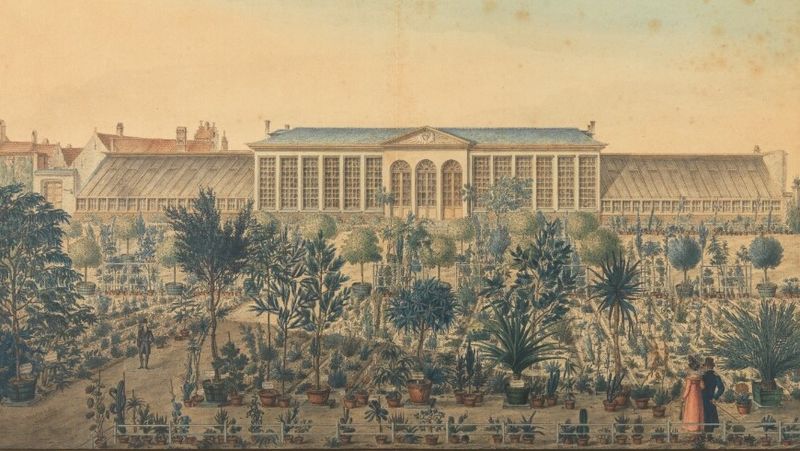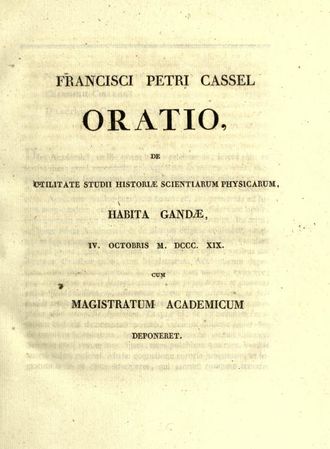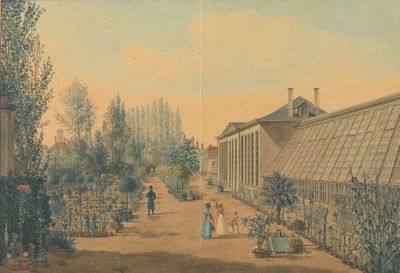Oratio De Utilitate Studii Historiae Scientiarum Physicarum (1819)
|
Oratio De Utilitate Studii Historiae Scientiarum Physicarum (1819)
In the state universities founded by William I, a rector had to be appointed each year, elected alternately from each of the four faculties. In 1818, it was the botanist Franz-Peter Cassel's (1784-1821) turn. The task of a rector was rather administrative, but he was also expected to deliver a public speech at the end of his rectorship. Usually those speeches dealt with developments within the rector's field of study. Cassel, however, chose a broader and more philosophical subject. On Oct. 4, 1819, he delivered a speech in latin on the usefulness of the study of natural sciences. The text was published soon after in French translation in the Annales belgiques des sciences, arts et littératures.
A story of progress
With what arguments did Cassel defend the study of the history of science? Cassel listed the main ones: "bien apprendre ces sciences, écarter les préjugés qui en arrêtent la progrès, et augmenter le domaine de la philosophie naturelle." [1] History of science taught how ideas had come about, how they had managed to overcome initial opposition, and how they had finally triumphed. For Cassel, history of science was a story of progress, and often it was due to the exemplary way researchers like Newton, Euler or Lavoisier had managed to reach deeper insights from accurate observation. The core of that progress was therefore to be found with Francis Bacon, who had laid the foundations of the scientific method. The history of science made it possible to trace not only the origins but also the knock-on effects of ideas. No less important was the moral example of the persistent and determined scholar, "brûlant du seul désir de connaître la nature" [2]. History was a life lesson for the young scientist.
Tradition and Innovation
However, the usefulness of the history of science was not limited to the study of fundamental discoveries and great examples. History also teaches us how the sciences flourished and how scientific thought repeatedly grafted itself onto the work of predecessors. A scientific breakthrough was not only the result of an unexpected discovery or a stroke of genius, but equally the result of how the knowledge of previous generations was kept and examined. By taking note of the state of science in previous centuries, it was possible to appreciate the unfolding of contemporary science. A third use for the history of science, Cassel found in the insight that history offered into the factors that thwarted the progress of the sciences. In particular, he referred to the Renaissance humanists' blind admiration for the Antique culture of Greeks and Romans. This had tempted 16th-century botanists to take the texts of Theophrastes, Pliny and Dioscorides as their sole guide. However, they would soon discover that not all plants in France and Germany could be traced back to the classical authors. Een derde vorm van nut vond Cassel in het inzicht dat de geschiedenis bood in de factoren die de vooruitgang van de wetenschappen hebben tegengewerkt. In het bijzonder verwees hij naar de blinde bewondering van de Renaissance humanisten voor de Antieke cultuur van Grieken en Romeinen. Dit had de botanici van de zestiende eeuw ertoe verleid de teksten van Theophrastes, Plinius en Dioscorides als enige leidraad te nemen. Zij zouden echter al snel ontdekken dat niet alle planten in Frankrijk en Duitsland terug te vinden waren bij de klassieke auteurs. Another obstacle was the preference in Antiquity and the Middle Ages for a secrecy of knowledge, where only the initiated could access the deepest truths. In this respect, Cassel sounds very modern.
In doing so, Cassel warned of another, more current threat to the sciences, namely that they are viewed by many as a form of entertainment. Physical experiments or natural history collections are viewed purely as entertainment or curiosities, "a view that is less rare than one might think". What is the point of science? Indeed, the question was not easy to answer because its immediate practical use was not always apparent. Science must be practised for its own sake, Cassel believed. It has its intrinsic and independent rights. Its practical usefulness will follow naturally for those who cultivate it. "The first scholar to investigate the properties of conic sections had no idea that projectiles followed a parabolic trajectory, and that celestial bodies moved on elliptical orbits." Cassel did not doubt it: "Il n'y pas de doute que les découvertes des sciences physiques ne puissent avoir la plus heureuse influence sur l'amélioration de l'ordre social et l'augmentation du bonheur public." [6] It was precisely the history of science, through its long succession of ideas and applications, that could show how the study of nature always led to the advancement of culture and the increase of prosperity. In the historical consideration of the sciences, it was possible to find the seeds of what the future would bring.
Science under William I
At the end of his speech, Cassel addressed William I, "le meilleur des monarques"[7], who had founded Ghent University. The role of enlightened monarchs on the progress of science had already been sufficiently demonstrated in history. Cassel was happy to point to William I's energetic policy of supporting the sciences in the construction and acquisition of scientific collections, physical and chemical instruments, botanical gardens and anatomical theatres. The day was incidentally given special splendour by the laying of the foundation stone of the Ghent Aula by baron Falck, William I's plenipotentiary minister . Whether Cassel's plea for the history of science found much support among his listeners cannot be ascertained. Cassel did not play on patriotic sentiments. He did mention a reasonable number of scholars from the Low Countries: Swammerdam, Ruysch, Schrader, Huygens, Boerhaave, Vesalius, Van Helmont and Dodoens, but without making any particular connection to the current state of the United Kingdom of the Netherlands. Possibly his speech did impress one of the students who graduated from Ghent University in 1819 and who, like Cassel, had taken a keen interest in the history of science: Adolphe Quetelet. For Cassel, there was no follow-up to his speech. In the spring of 1820, he had to stop teaching for health reasons. He died the following year, on 8 June 1821.
Bibliography:
Notes
|


